Related Research Articles
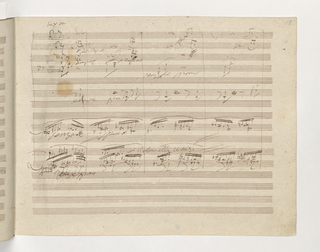
The Symphony No. 9 in D minor, Op. 125, is a choral symphony, the final complete symphony by Ludwig van Beethoven, composed between 1822 and 1824. It was first performed in Vienna on 7 May 1824. The symphony is regarded by many critics and musicologists as a masterpiece of Western classical music and one of the supreme achievements in the history of music. One of the best-known works in common practice music, it stands as one of the most frequently performed symphonies in the world.
The Anthem of Europe or European Anthem, also known as Ode to Joy, is a piece of instrumental music adapted from the prelude of the final movement of Beethoven's 9th Symphony composed in 1823, originally set to words adapted from Friedrich Schiller's 1785 poem "Ode to Joy". In 1972, the Council of Europe adopted it as an anthem to represent Europe, and later in 1985 it was also adopted by the European Union.

Ludwig van Beethoven was a German composer and pianist. He is one of the most revered figures in the history of Western music; his works rank among the most performed of the classical music repertoire and span the transition from the Classical period to the Romantic era in classical music. His early period, during which he forged his craft, is typically considered to have lasted until 1802. From 1802 to around 1812, his middle period showed an individual development from the styles of Joseph Haydn and Wolfgang Amadeus Mozart, and is sometimes characterized as heroic. During this time, he began to grow increasingly deaf. In his late period, from 1812 to 1827, he extended his innovations in musical form and expression.

A symphony is an extended musical composition in Western classical music, most often for orchestra. Although the term has had many meanings from its origins in the ancient Greek era, by the late 18th century the word had taken on the meaning common today: a work usually consisting of multiple distinct sections or movements, often four, with the first movement in sonata form. Symphonies are almost always scored for an orchestra consisting of a string section, brass, woodwind, and percussion instruments which altogether number about 30 to 100 musicians. Symphonies are notated in a musical score, which contains all the instrument parts. Orchestral musicians play from parts which contain just the notated music for their own instrument. Some symphonies also contain vocal parts.

Eugene Ormandy was a Hungarian-born American conductor and violinist, best known for his association with the Philadelphia Orchestra, as its music director. His 44-year association with the orchestra is one of the longest enjoyed by any conductor with any American orchestra. Ormandy made numerous recordings with the orchestra, and as guest conductor with European orchestras, and achieved three gold records and two Grammy Awards. His reputation was as a skilled technician and expert orchestral builder.
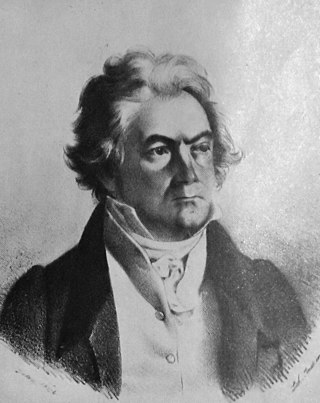
Ludwig van Beethoven's Bagatelles, Op. 126 for solo piano were published late in his career, in the year 1825. Beethoven dedicated them to his brother Nikolaus Johann van Beethoven (1776–1848), and wrote to his publisher, Schott Music, that the Opus 126 Bagatelles "are probably the best I've written".
The curse of the ninth is a superstition connected with the history of classical music. It is the belief that a ninth symphony is destined to be a composer's last and that the composer will be fated to die while or after writing it, or before completing a tenth.
Absolute music is music that is not explicitly "about" anything; in contrast to program music, it is non-representational. The idea of absolute music developed at the end of the 18th century in the writings of authors of early German Romanticism, such as Wilhelm Heinrich Wackenroder, Ludwig Tieck and E. T. A. Hoffmann but the term was not coined until 1846 where it was first used by Richard Wagner in a programme to Beethoven's Ninth Symphony.
Ludwig van Beethoven's Symphony No. 10 in E♭ major is a hypothetical work, assembled in 1988 by Barry Cooper from Beethoven's fragmentary sketches for the first movement. All the sketches assembled were clearly intended for the same symphony, which would have followed the Ninth, since they appear together in several small groups, and there is consensus that Beethoven did intend to compose another symphony. Cooper's score was first performed at a concert given in 1988 by the Royal Philharmonic Society, London, to whom Beethoven himself had offered the new symphony in 1827. The score is published by Universal Edition, Vienna, and appeared in a new edition in 2013. In 2019, artificial intelligence was used to reconstruct the third and fourth movements of the symphony, which premiered 9 October 2021, titled Beethoven X: The AI Project.
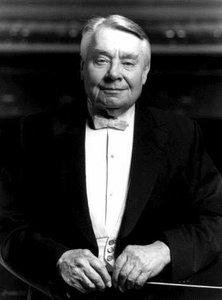
Robert Lawson Shaw was an American conductor most famous for his work with his namesake Chorale, with the Cleveland Orchestra and Chorus, and the Atlanta Symphony Orchestra and Chorus. He was known for drawing public attention to choral music through his wide-ranging influence and mentoring of younger conductors, the high standard of his recordings, his support for racial integration in his choruses, and his support for modern music, winning many awards throughout his career.

Copying Beethoven is a 2006 American dramatic film released by Metro-Goldwyn-Mayer and directed by Agnieszka Holland which gives a fictionalized take on the triumphs and heartaches of Ludwig van Beethoven's last years.

François Antoine Habeneck was a French classical violinist and conductor.
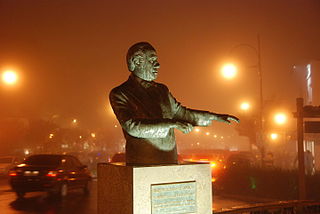
Eleazar de Carvalho was a Brazilian conductor and composer.

Sir Gilbert Levine, GCSG is an American conductor. He is considered an "outstanding personality in the world of international music television." He has led the PBS concert debuts of the Staatskapelle Dresden, Royal Philharmonic, London Philharmonic, Philharmonia Orchestra, WDR Symphony Orchestra, and the Pittsburgh Symphony, and the PBS premieres of works including the Beethoven Missa Solemnis, Bach Magnificat in D, Haydn Creation, and Bruckner Symphony 9.
James Arnold Hepokoski is an American musicologist. He is best known for his work with Warren Darcy on developing sonata theory, first fully explained in their 2006 book Elements of Sonata Theory.

Max Paul Eugen Bekker was a German music critic and author. Described as having "brilliant style and […] extensive theoretical and practical knowledge," Bekker was chief music critic for both the Frankfurter Zeitung (1911–1923), and later the New Yorker Staats-Zeitung (1934–1937).
Jonathan Del Mar is a British music editor and conductor.

Joseph Böhm was a Hungarian violinist and a director of the Vienna Conservatory.
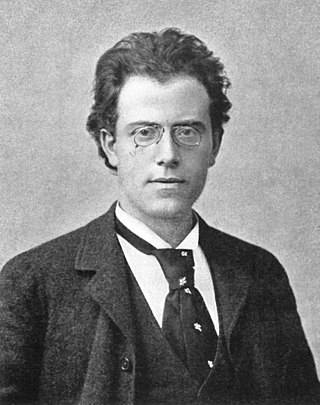
Gustav Mahler's orchestration of Beethoven's Ninth Symphony was a decades-long project to modernize the symphony through the incorporation of modern instruments and techniques. Mahler's orchestration of the Ninth remains controversial and its critical reception has been mixed.

Timothy L. Jackson is an American professor of music theory who has spent most of his career at the University of North Texas and specializes in music of the eighteenth through twentieth centuries, Schenkerian theory, politics and music. He is the co-founder of the Journal of Schenkerian Studies. In 2020, he became controversial for editing a special issue of that journal containing articles criticizing Philip Ewell's plenary talk "Music Theory's White Racial Frame".
References
- ↑ "Beethoven: The Ninth Symphony | Yale University Press". yalebooks.yale.edu.